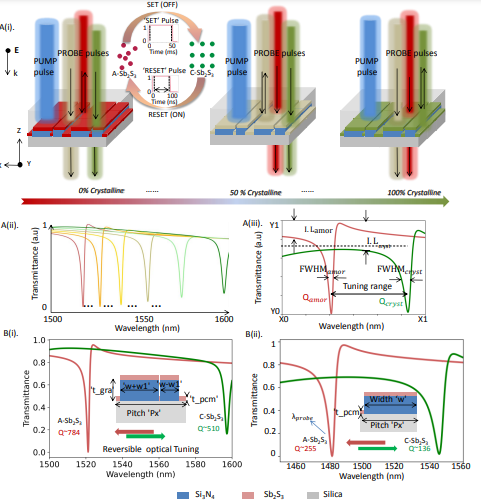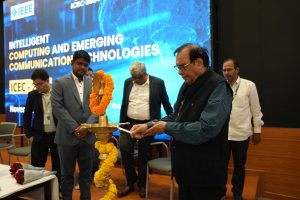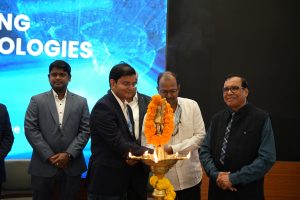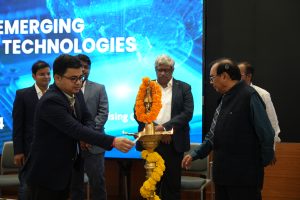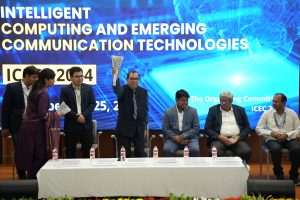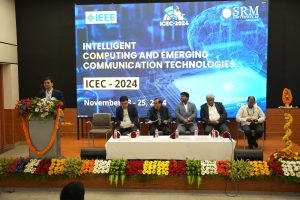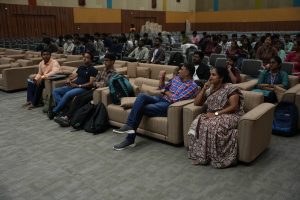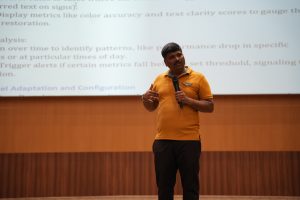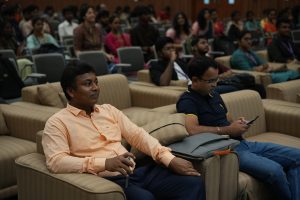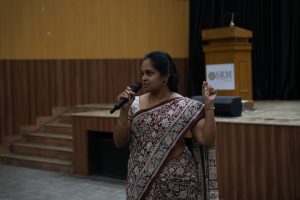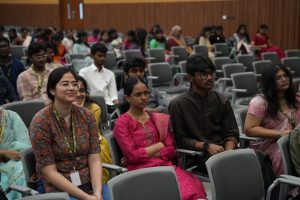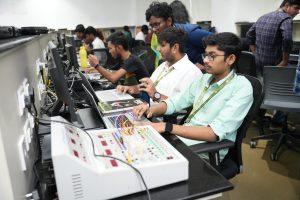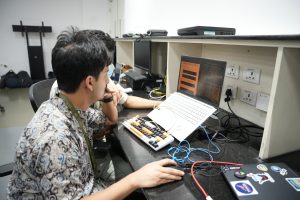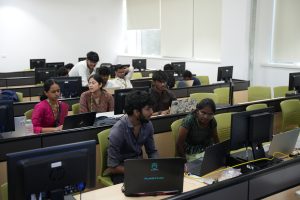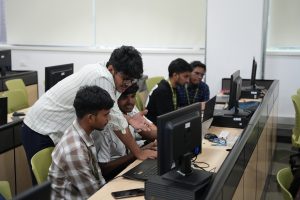All Management Events
- Advancing Next-Gen Networks with MIMO Channel Capacity at 300 GHz November 28, 2024
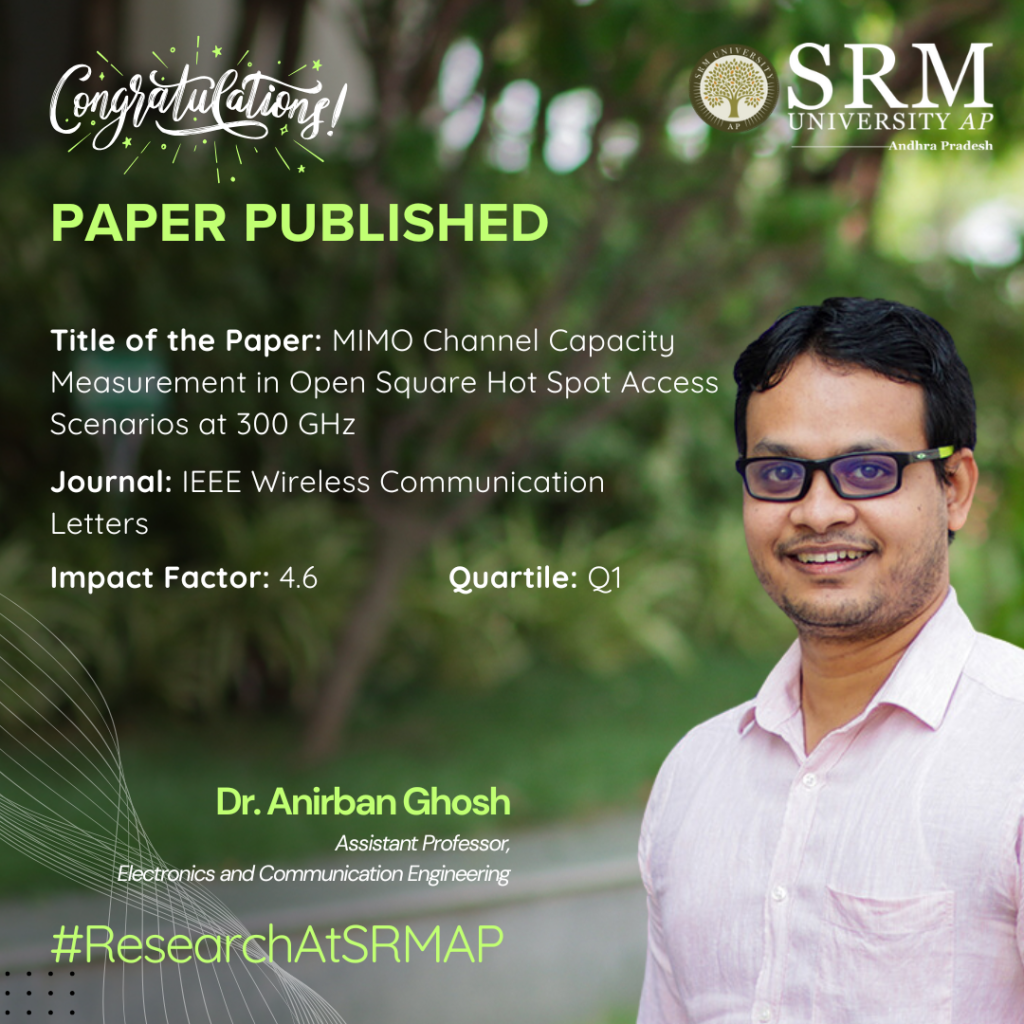
The Department of Electronics and Communication Engineering is pleased to announce the publication of a significant research paper by Dr Anirbhan Ghosh, Assistant Professor, exploring MIMO channel capacity at high frequencies (300 GHz), which holds great potential for beyond 5G and 6G networks. The paper “MIMO Channel Capacity Measurement in Open Square Hot Spot Access Scenarios at 300 GHz” published in the Q1 journal IEEE Wireless Communication Letters, investigates data transmission in three different line-of-sight (LoS) scenarios and contributes to building the next generation of communication networks, which will have a significant positive impact on society by improving connectivity, supporting technological advancements, and promoting economic development.
Abstract
This letter explores the possibility and effectiveness of using multiple communication paths for futuristic outdoor networks, focusing on three scenarios: clear line-of-sight (LoS), partially obstructed line-of-sight (OLoS), and completely blocked line-of-sight (NLoS). A study was conducted at a high frequency of 300 GHz to measure how many useful communication paths are available for transmitting data simultaneously. Based on the results, the average data transmission capacity for these paths was calculated, both with and without the help of passive reflecting surfaces (PRS). The findings show that using multiple antennas significantly boosts the average data capacity, and PRS further enhances this improvement.
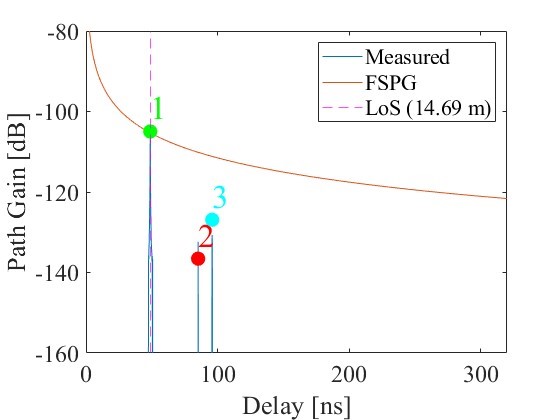
Practical Implementation of the Research
The results align with the design of high-frequency, ultra-high-speed, low-latency, reliable communication envisioned for several futuristic applications beyond 5G and 6G Networks.
Collaborations
Prof. Minseok Kim, Professor, Faculty of Engineering, Course of Electrical and Electronics Engineering, Niigata University, Japan.
Dr Ghosh plans to extend his efforts to other communication scenarios for a similar study. He opines that generating appropriate channel models, coverage design, etc., for the explored scenario would also be an exciting study.
Continue reading → - Dr Rangabhasiyam on Tackling the Issue of Microplastic Pollution November 28, 2024
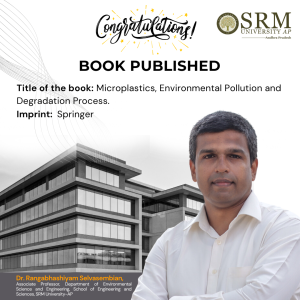 Microplastic pollution is an urgent environmental crisis that threatens ecosystems on land and in water. Addressing this critical issue, Associate Professor and HoD, Dr Rangabhashiyam Selvasembian from the Department of Environmental Science and Engineering has published a groundbreaking book titled Microplastics, Environmental Pollution and Degradation Process with Springer. This book examines the perilous effects of microplastics, their characterisation, and innovative treatment strategies. By integrating the latest research and insights, Dr Selvasembiyan’s work serves as a vital guide for students, researchers, and policymakers committed to combating microplastics and protecting our environment.
Microplastic pollution is an urgent environmental crisis that threatens ecosystems on land and in water. Addressing this critical issue, Associate Professor and HoD, Dr Rangabhashiyam Selvasembian from the Department of Environmental Science and Engineering has published a groundbreaking book titled Microplastics, Environmental Pollution and Degradation Process with Springer. This book examines the perilous effects of microplastics, their characterisation, and innovative treatment strategies. By integrating the latest research and insights, Dr Selvasembiyan’s work serves as a vital guide for students, researchers, and policymakers committed to combating microplastics and protecting our environment.About this Book
This book presents microplastics pollution in land and water bodies, their hazardous effects, characterization approaches, and suitable means of utilizing advanced treatment options to solve the problem. It is mainly understood that microplastic pollutants are associated with water bodies, however there also exists soil contamination and their interaction with the food web. The discussions related to strategies and policies for the management of microplastics are very limited. This book not only narrows microplastic pollution in marine or fresh water bodies, but also takes into account the terrestrial environment, including the toxicity effects, characterization aspects and treatment approaches. The main feature of the book includes latest research related to microplastics pollution, examining the different health effects including environmental (related) issues and highlights the advances in treatment approaches. The book serves as a guide with an up-to-date information on microplastics related problems useful for students, researchers, professionals/environmentalists and also as a reference for policy makers.
Collaborations:
- Professor Ajay Kumar Mishra, Professor – Durban University of Technology, South Africa.
- Dr. Pankaj Raizada, Professor -School of Advanced Chemical Sciences, Shoolini University, Solan (H.P) India.
- Dr Elsayed T Helmy, Researcher – National Institute of Oceanography and Fisheries, Egypt
- Prof. Santhiagu Arockiasamy Professor- National Institute of Technology Calicut, India.
Link to the article: https://doi.org/10.1007/978-981-97-6461-7
Continue reading → - Tracing Feminist Discourse in the Intellectual Output of Women Trade Unionists in Late Colonial Bengal November 28, 2024
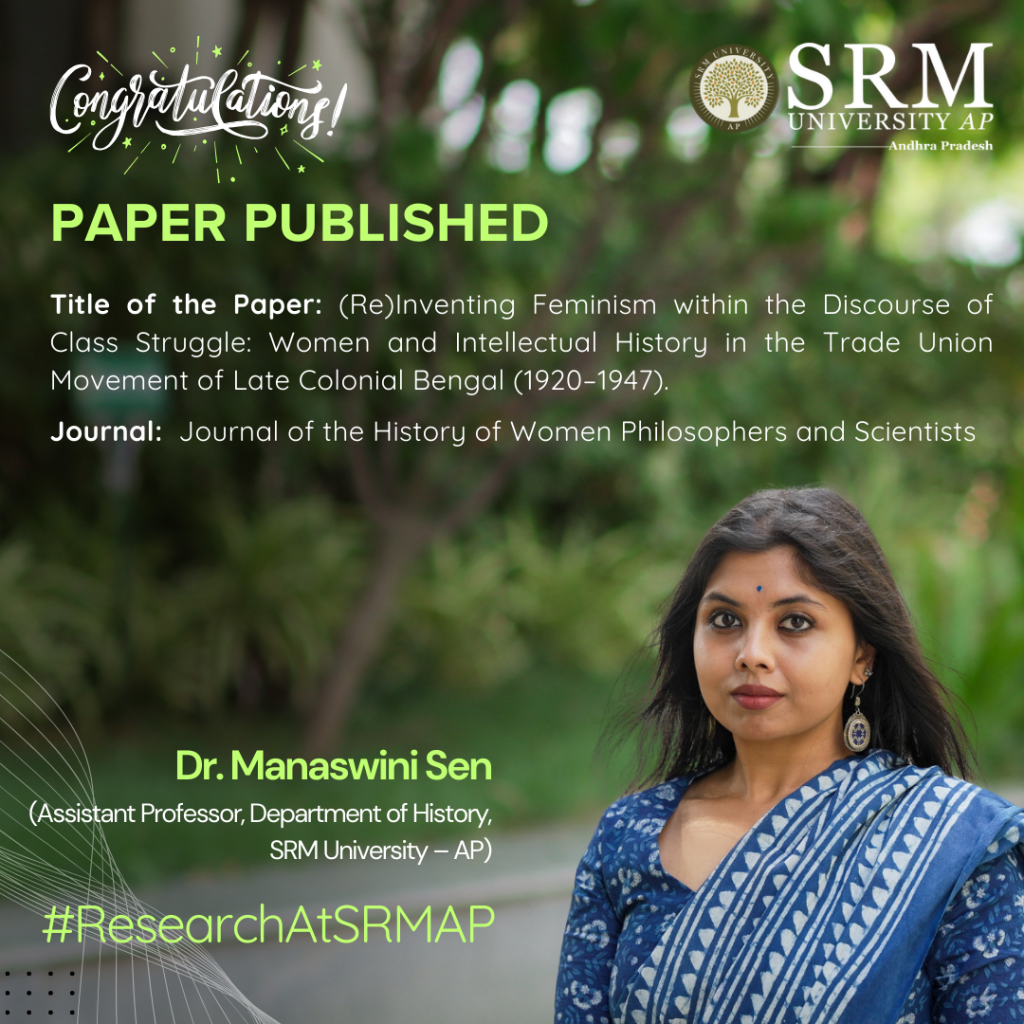
Dr Manaswini Sen, Assistant Professor at the Department of History, has published an insightful paper tracing the ideological and intellectual output of women trade unionists in late colonial Bengal. Her research paper titled “(Re)Inventing Feminism within the Discourse of Class Struggle: Women and Intellectual History in the Trade Union Movement of Late Colonial Bengal (1920–1947)”, published in the prestigious Journal of the History of Women Philosophers and Scientists, offers a novel perspective on understanding the class struggle, anticolonial discourse in the patriarchal society of colonial Bengal.
Abstract
This paper envisages (re)constructing the intellectual praxis of women trade unionists in late colonial Bengal. By arguing how political practice habitually translates to political thought, the paper devises a methodology to address the gendered discourse of intellectual history in the Global South. It focuses on intellectual output, primarily journal articles of women trade unionists like Santoshi Kumari Gupta, Maitreyee Bose, and Kanak Mukherjee, to trace a genealogy of how class struggle was perceived by women labour activists across the ideological spectrum of nationalism, socialism, and communism between 1920 to 1947 in Bengal. The piece is an effort to transcend the manifold marginalisations that plague the establishment of feminine political praxis within the regulating structures of colonialism and capitalism. In the process, it bids to unfold an alternative narrative of the anti-colonial, anti-capitalist, and anti-patriarchal narrative of the decolonisation of South Asian intellectual thought.
Research, Collaboration and Future Research Plans
The research strives to bring to the forefront the intellectual contributions of three female trade unionists in the late colonial period to trace the evolution of discourses on anticolonial class struggle from a gendered perspective. With the global turn in intellectual history, there is an augmented effort at amplifying the ‘small voices of history’. The inherent socio-cultural predicaments in our society make it inordinately challenging to trace conventional sources for mapping the intellectual endeavours of women. This paper aims to rectify this gap by reconstructing women labour activists’ intellectual practises and literary output in the early 20th century. In the process, the research tries to bring forth narratives of anticolonialism, which drowns in the overwhelming presence of nationalism in the discourses of decolonisation of South Asia. This paper was the result of academic exchanges with professors of Benaras Hindu University, Dr B.R. Ambedkar University, Delhi, and the University of Paderborn, Germany.
Dr Sen primarily researches marginal anticolonial epistemological traditions of South and South East Asia. Her thesis on the evolution and dissemination of socialism in late colonial Bengal, which focuses on an intellectual history of trade unionism, forms the basis of her first monograph. However, she is now focusing on the transnational and transcontinental intellectual networks of a wide spectrum of leftist labour activists and proto-nationalists and the ways these fringe intellectual traditions interacted with each other and nationalism. Based on a rich archive across India and Europe and a plethora of alternative sources, she tends to devise new methodological interventions in the field of Global Intellectual History, making labour history more accessible and relevant in scholarly circles.
Continue reading → - Decolonial Insights on Partition in Indian Comics November 27, 2024

Dr Partha Bhattacharjee, Assistant Professor from the Department of Literature and Languages, along with his scholar Mr Rounak Gupta has published their paper titled “Fractured Identities and Wounded Memories in Indian Comics on Partition: A Decolonial Reading of Frame and Panel” in the esteemed Q1 journal Journal of Graphic Novels and Comics. This paper explains comics as a medium whose panels, frames, and stylistic aspects can be interpreted in the Indian context. This interpretation has been read as a decolonial intervention into the medium’s history and the established aesthetic theories.
Abstract
Within the liaison of decoloniality studies and comics studies, this paper investigates how the decolonial visual style in the comics anthology This Side That Side (2013) has been used to locate the traumatised past and violation of human rights due to the “b/ordering” practices of partition of India (Rifkind 2017; Bhattacharjee and Tripathi 2022). “The Taboo” by Malini Gupta and Dyuti Mittal, “An Afterlife” by Sanjoy Chakraborty, and “Making Faces” by Orijit Sen cultivate the stories of the inhumane condition of the migrants and victims during and after the Indo-Pakistan and Indo-Bangladesh-Pakistan partition. These narratives exemplify decolonised counter comics narratives on collective and personal memories (Chute 2016; Mickwitz 2016; Ahmed and Crucifix 2018) inflicted upon and against the dominant partition discourse. They help churn out the human stories of the interminable psychological violence of partition and post-partitioned reality.
The paradigm established in this research can later be used to interpret different formations within comics, especially pertaining to decolonial aesthetics, dialogue, and attitude.
Collaborations
This paper has been published as a part of a continuing study that began with the preceding paper – Bhattacharjee, Partha, and Priyanka Tripathi. 2022. “Penning the Pain of Partition: Refugee Camp Narratives in Indian Comics.” Studies in Comics 12(2): 179-200. DOI: https://doi.org/10.1386/stic_00062_1.
Continue reading → - ICEC-2024: A Pivotal Event in Emerging Technologies for Computing and Communication November 27, 2024
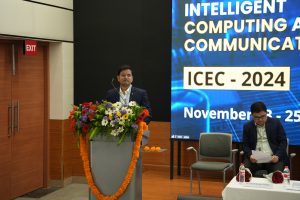 The International Conference on Emerging Computing and Communication Technologies (ICEC-2024) was successfully hosted at SRM University-AP, India, in collaboration with the IEEE Hyderabad Section and IEEE Guntur Subsection. The event served as a vital platform for discussing the latest advancements in computing and communication technologies, attracting a diverse group of scholars, researchers, industry experts, and students from around the world.
The International Conference on Emerging Computing and Communication Technologies (ICEC-2024) was successfully hosted at SRM University-AP, India, in collaboration with the IEEE Hyderabad Section and IEEE Guntur Subsection. The event served as a vital platform for discussing the latest advancements in computing and communication technologies, attracting a diverse group of scholars, researchers, industry experts, and students from around the world.ICEC-2024 received an impressive 906 research paper submissions, showcasing the conference’s wide-reaching appeal. The organising committee maintained stringent review standards, ultimately resulting in a selective acceptance rate of 15%. This rigorous process led to 137 high-quality papers being accepted for presentation, highlighting the conference’s international recognition, with 24% of the accepted works originating from international authors.
The conference featured seven keynote presentations from distinguished speakers like Prof. Ganapati Panda, Ex-Deputy Director, IIT Bhubaneswar, Prof. Ashish Ghosh, Director, IIIT Bhubaneswar, Prof. Sudip Misra, IIT Kharagpur, Prof. Deepak Puthal, IIM Bodh Gaya, Prof. Korra Sathya Babu, IITDM Kurnool, Prof. Y Vijayalata, Chair, IEEE Hyderabad Section, Prof. Sreenivasa Reddy, Chair, IEEE Guntur Subsection. Their insightful talks offered valuable perspectives on emerging trends and technologies. The lineup also included contributions from other notable academics, enhancing the depth and breadth of discussion at the event.
Participants benefited from intellectually stimulating sessions led by esteemed chairs who facilitated discussions on a diverse range of topics, including artificial intelligence, machine learning, advanced networking, and quantum computing. This environment fostered a vibrant exchange of ideas, promoting innovation through collaborative efforts between academia and industry.
One of the conference’s core themes was the importance of collaboration in overcoming global challenges, emphasising how emerging technologies can play a crucial role in this effort. The high level of organisation and execution was made possible by the dedication of the ICEC-2024 organising committee, including the convener, Dr Sambit Kumar Mishra, and co-conveners Dr Jatindra Kumar Dash, Dr Murali Krishna Enduri, and Dr V M Manikandan. Their efforts, along with the assistance of volunteers and technical teams, ensured a smooth conference experience for all participants.
In recognition of outstanding contributions, 16 papers were awarded the best paper accolade for their exceptional quality. At the closing ceremony, Dr Sambit Kumar Mishra announced that all 137 accepted papers would receive publication in IEEE Xplore, indexed by Scopus. Moreover, approximately 10% of these works would receive extended invitations for submission to the SN Computer Science Journal, published by Springer.
ICEC-2024 left a profound impact on attendees, inspiring a continued pursuit of excellence in research and innovation. The conference not only highlighted the significance of emerging computing and communication technologies but also set the groundwork for future advancements in the field. As participants departed, the buzz of excitement and the spark of new ideas filled the air, marking ICEC-2024 as a truly remarkable event in the technology landscape.
Continue reading → - Bridging the Skill Gap: Why Middle Managers Must Embrace Skill Upgradation to Stay Relevant November 27, 2024
Finanacial Express
Continue reading →
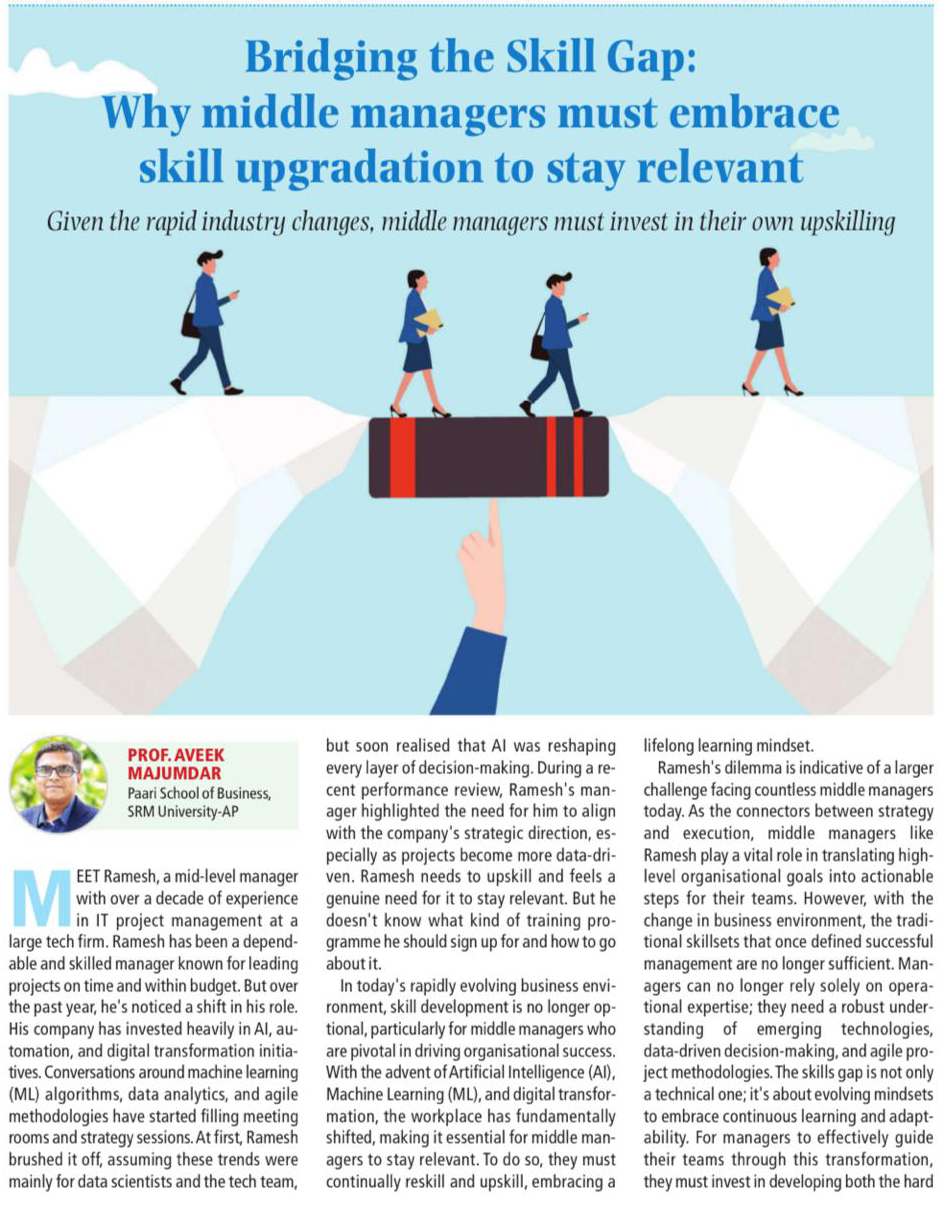
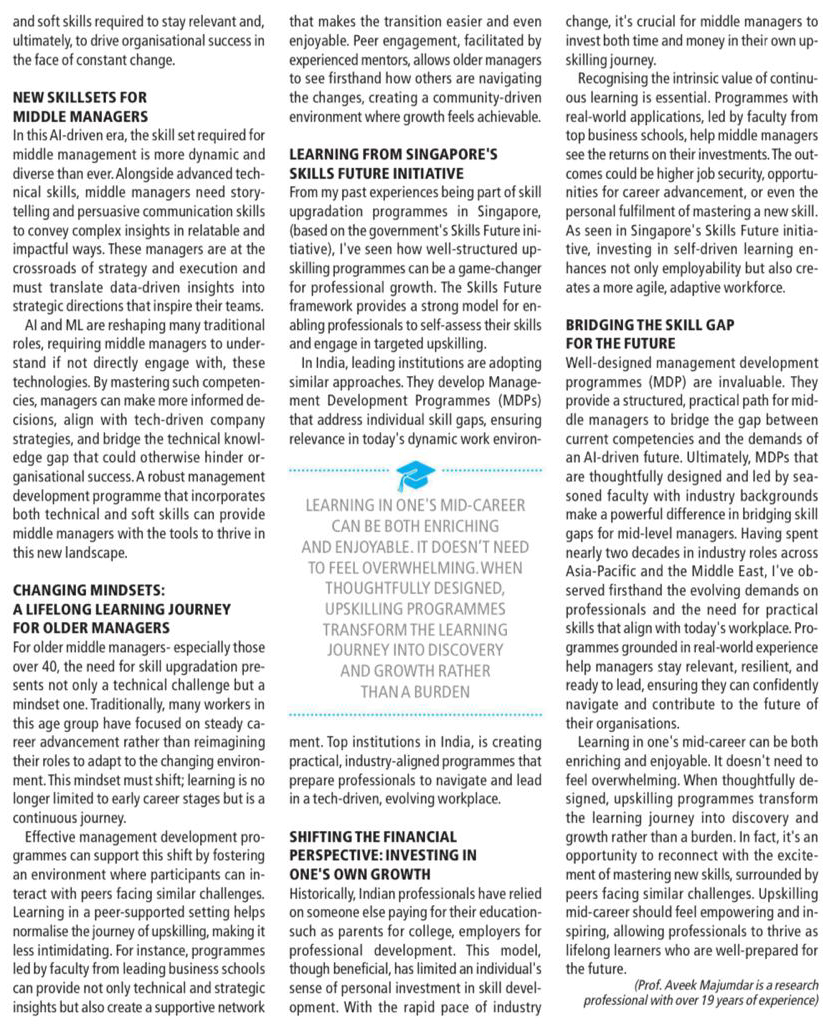
Amaravati Today
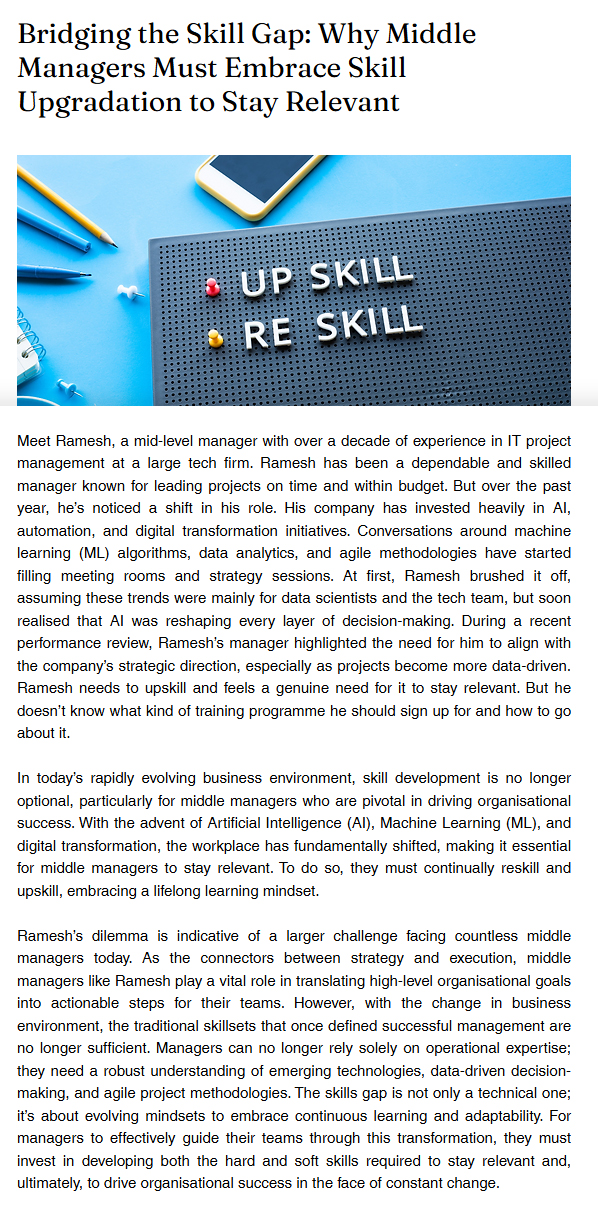
DNP Education
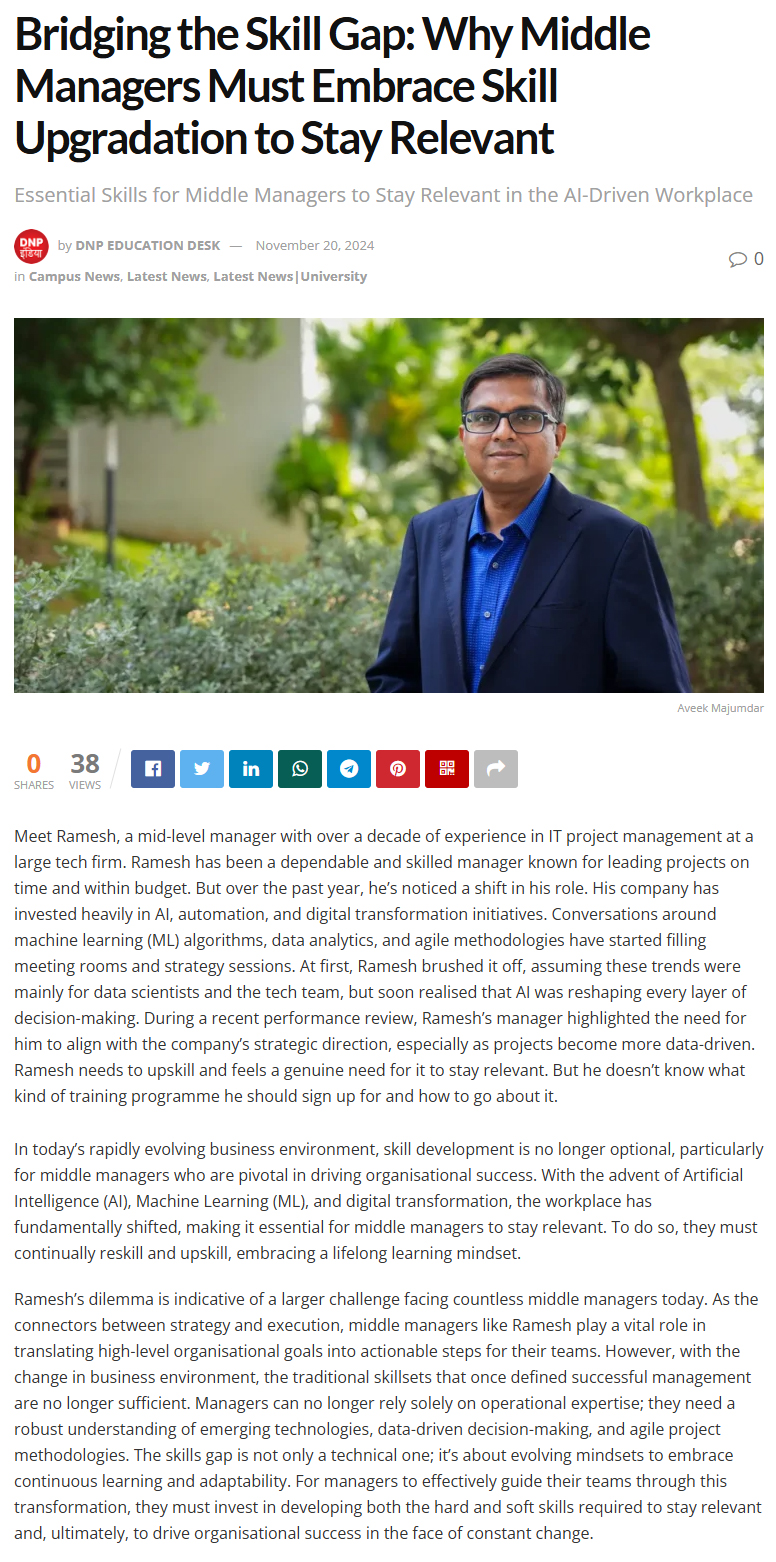
DNP India
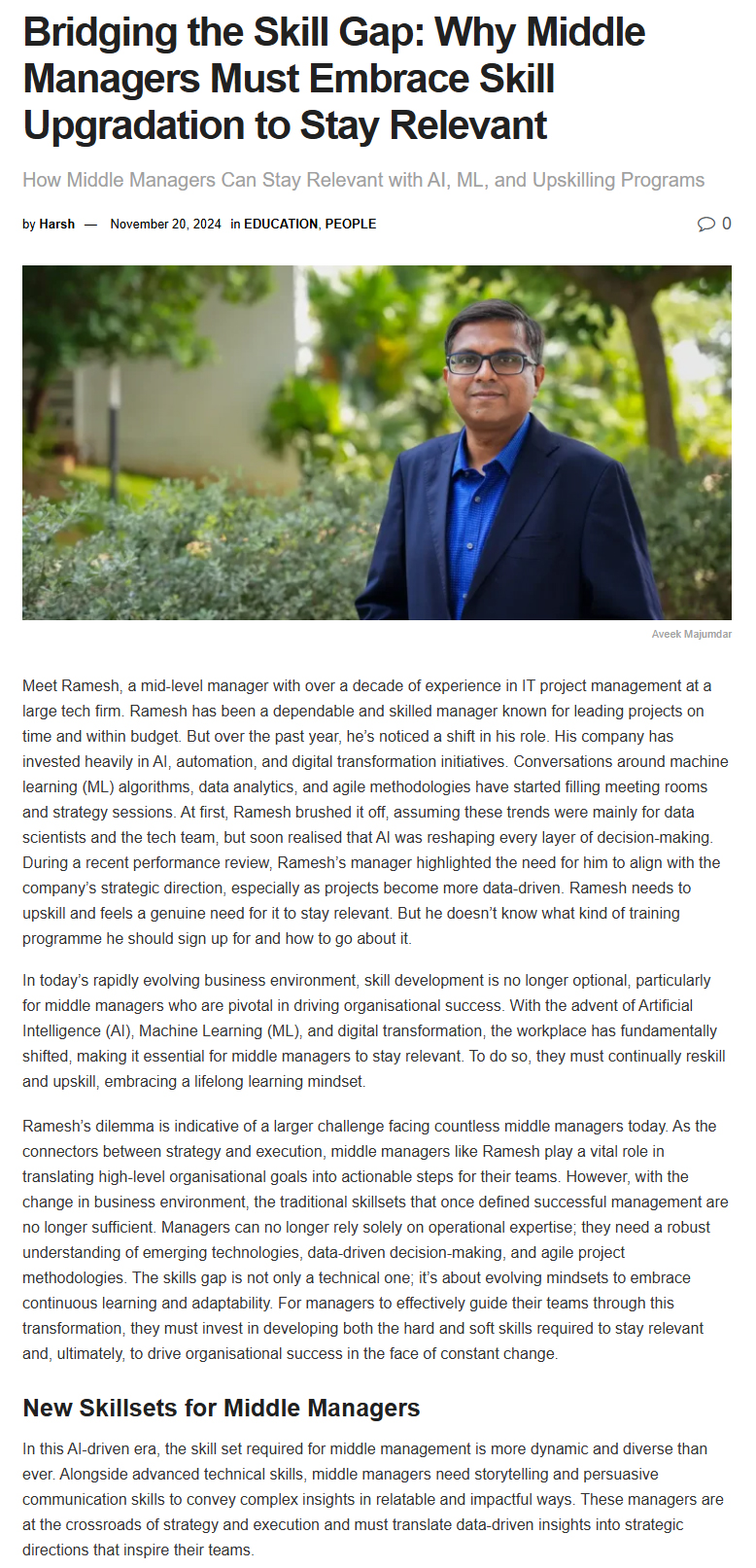
- Insights on (Re)Framing Identity by Dr Stella November 27, 2024
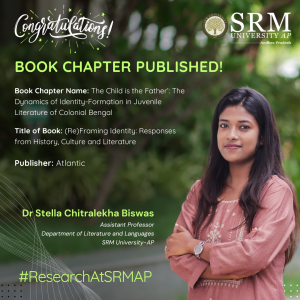 The complexities of identity in literature are a significant area of scholarly inquiry, especially in colonial and postcolonial studies. A key addition to this discourse is Assistant Professor, Dr Stella Chitralekha Biswas’ book chapter on “The Child is the Father: The Dynamics of Identity-Formation in Juvenile Literature.” in the anthology, (Re)Framing Identity: Responses from History, Culture and Literature by Atlantic Publishers & Distributors.
The complexities of identity in literature are a significant area of scholarly inquiry, especially in colonial and postcolonial studies. A key addition to this discourse is Assistant Professor, Dr Stella Chitralekha Biswas’ book chapter on “The Child is the Father: The Dynamics of Identity-Formation in Juvenile Literature.” in the anthology, (Re)Framing Identity: Responses from History, Culture and Literature by Atlantic Publishers & Distributors.A Brief Introduction to the Book:
This anthology (Re)Framing Identity: Responses from History, Culture and Literature is a significant and timely effort to understand the issues of identity because in the postmodern age, it is one of the highly debated and discussed issues in the field of History, Culture and Literature. In the postmodern age, the question of identity with reference to literature becomes important because the monolithic idea of identity is challenged in both imaginative and critical works. The significance of this anthology also lies in the fact that it scrutinizes the process of identity formation in the Indian subcontinent and problematizes the notions of its unity and continuity across time and space philosophers. This anthology continues the tradition of the critique of identity formation right from Stuart Hall, who, in his article in Questions of Cultural Identity (1996) says, “The deconstruction has been conducted within a variety of disciplinary areas, all of them, in one way or another critical of the notion of an integral, originary and unified identity”. Therefore the purported aim of this anthology is to analyse the conflicts and amalgamation among numerous races, ethnic groups, religions, linguistic acommunities and various other stakeholders and to understand how these conflicts and amalgamations resulted in the formation of diversified identities in the light of Stuart Hall’s ideas, “identities are never unified and, in late modern times, increasingly fragmented and fractured; never singular but multiply constructed across different, often intersecting and antagonistic, discourses, practices and positions. They are subject to a radical historicization, and are constantly in the process of change and transformation”
Significance of the Book Chapter:
The understanding of identity formation has evolved from the philosophical understanding to its discursive formation and further to the neurological understanding of how identity is shaped. The fundamental idea followed in the anthology can be summed in by Stuart Hall, “actually identities are about questions of using the resources of history, language and culture in the process of becoming rather than being: not ‘who we are’ or ‘where we came from’, so much as what we might become, how we have been represented and how that bears on how we might represent ourselves. Identities are therefore constituted within, not outside representation. They relate to the invention of tradition as much as to tradition itself, which they oblige us to read not as an endless reiteration but as ‘the changing same’ not the so-called return to roots but a coming-to-terms-with our ‘routes’. They arise from the narrativization of the self, but the necessarily fictional nature of this process in no way undermines its discursive, material or political effectivity, even if the belongingness, the ‘suturing into the story’ through which identities arise is, partly, in the imaginary (as well as the symbolic) and therefore, always, partly constructed in fantasy, or at least within a fantasmatic field”. This particular analysis of identity formation in the Indian subcontinent under numerous pressures exerted through various mediums like literature, folk theatre and literature and philosophical texts not only in India but outside as well among the Indian diaspora located especially in Euro-American parts of the world, making this anthology a crucial book not only in the country but also at an international level.
Target Audience:
It is inspiriting to read such exhaustive literary anthology by eminent academicians and scholars and broadens one’s horizon of critical thinking as one goes through the collection. The book will definitely open up new trajectories of research in the field of postcolonial studies, bhasha literature and identity theory. It will also motivate students and researchers to explore the formation and representation of identities in the subcontinent in terms of culture, race, ethnicity, language, religion, caste, gender and politics.
Continue reading → - An Insightful Lecture on Student Migration November 26, 2024

Prof. Irudaya Rajan, Founder Chair of the International Institute of Migration and Development and Distinguished Visiting Faculty at the Department of Economics, Easwari School of Liberal Arts, engaged with faculties, scholars and students on a compelling talk on “The Future of Student Migration” on November 22, 2024. Prof. Rajan delved into the crucial role of migration in shaping and redefining national demographics and offered valuable insights into internal and international migration trends, explaining their profound impact on labour markets, education systems, and policy-making. His talk sparked engaging debates and discussions, enriching the understanding of migration as a dynamic force in demographic change and national development.
During his visit, Prof. Rajan also interacted with faculty and students, discussing collaborative research projects and sharing his expertise. The session was a thought-provoking exploration of migration’s pivotal influence on global and local contexts, leaving the audience with much to reflect upon.
Continue reading → - Industry Ignite Hackathon: A 24-Hour Innovative Experience November 26, 2024
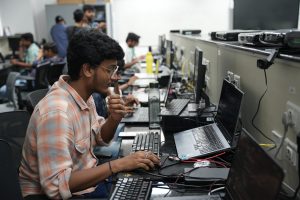 The Industry Ignite Hackathon, conducted at SRM University-AP from November 6 to 7, 2024, was organised by the Department of Electronics and Communication Engineering in collaboration with NanoChip through its Elevium Platform. The event specifically designed for BTech and MTech students, provided them with a valuable platform to address real-world challenges in embedded systems and to facilitate a connection between academia and industry. With a total of 250 participants divided into 18 teams, the hackathon offered a hands-on experience focused on industry-driven problem statements.
The Industry Ignite Hackathon, conducted at SRM University-AP from November 6 to 7, 2024, was organised by the Department of Electronics and Communication Engineering in collaboration with NanoChip through its Elevium Platform. The event specifically designed for BTech and MTech students, provided them with a valuable platform to address real-world challenges in embedded systems and to facilitate a connection between academia and industry. With a total of 250 participants divided into 18 teams, the hackathon offered a hands-on experience focused on industry-driven problem statements.The inauguration took place at the APJ Abdul Kalam Auditorium, where industry experts from NanoChip presented a complex problem statement related to embedded systems. Following a comprehensive briefing on the hackathon’s rules and expectations, participants commenced their 24-hour coding marathon.
The hackathon concluded with a special session led by Mr. Hari, CEO of NanoChip, who delivered a talk on System on Chip (SoC) Design Flow, offering participants valuable insights into the design process and its applications within embedded systems. Subsequently, representatives from NanoChip showcased their Elevium Learning Process, introducing advanced tools and methodologies for high-performance embedded systems.
The valedictory ceremony celebrated the achievements of the participants, with awards and internships presented to the top-performing teams. The winning team received an Industrial Internship along with trophies and certificates, while the second and third-place teams were also recognised with trophies.
SRM University-AP extended its gratitude to NanoChip, the event sponsors, and the entire organising team, including Dr K A Sunitha, Dean of SEAS, as well as other faculty members, for their steadfast support. The hackathon served as a testament to the varsity’s commitment to fostering collaboration between academia and industry and providing students with opportunities to develop innovative solutions for real-world challenges.
Continue reading → - Advancements in Optical Technologies: Paper by Dr Devdutt Tripathi November 26, 2024
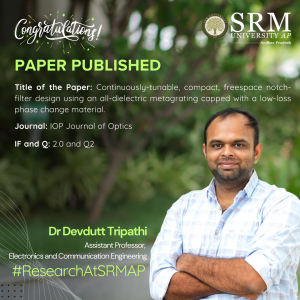 This research paper titled, “Continuously-tunable, compact, freespace notch-filter design using an all-dielectric metagrating capped with a low-loss phase change material” by Dr Devdutt Tripathi, Assistant Professor, Department Electronics and Communication Engineering explores the use of active metasurfaces combined with phase change materials (PCMs) to enhance optical technologies thereby enhancing optical technologies across various sectors including telecommunications and imaging sectors.
This research paper titled, “Continuously-tunable, compact, freespace notch-filter design using an all-dielectric metagrating capped with a low-loss phase change material” by Dr Devdutt Tripathi, Assistant Professor, Department Electronics and Communication Engineering explores the use of active metasurfaces combined with phase change materials (PCMs) to enhance optical technologies thereby enhancing optical technologies across various sectors including telecommunications and imaging sectors.Abstract:
Active metasurfaces utilising phase change materials (PCMs) are currently under investigation for applications in free-space optical communication, optical signal processing, neuromorphic photonics, quantum photonics, and compact LiDAR. Attention has now turned towards novel PCM like Sb2S3 which exhibit lower optical absorption and reasonable values of refractive-index contrast in comparison to traditional data-storage PCM. We propose and numerically study the class of all-dielectric metagratings capped with low-loss PCM and predict the possibility of continuously tunable resonances whose quality factors degrade gracefully during the amorphous-to-crystalline phase transition of the PCM. Specifically, we consider the CMOS-compatible silicon-nitride on silica substrate material platform for simple and asymmetric metagratings (in particular, the symmetric-broken dimerization) and Sb2S3 capping. Our numerical study predicts that notch-filters operating around the 1550 nm NIR wavelength window can be achieved with tuning range of over 76 nm with Q-factors ranging from 784 (amorphous-phase) to 510 (crystalline-phase) (a degradation in Q of about 35%) and insertion loss of about 0.9 dB. These performance figures are a significant improvement over previously published designs utilizing data-storage PCMs and other traditional notch-filter mechanisms. We examine the influence of grating dimerization and geometrical parameters on performance metrics of the notch-filter and predict the possibility to trade-off rejection-band and in-band spectral transmission properties. Lastly, we perform a study of an all-optical phase change mechanism. Our study is promising for the miniaturization of tunable notch-filter based optical systems.
Explanation in Layperson’s Terms:
This research explores the use of advanced materials called metasurfaces (engineered materials especially in a 2D thin film structure), combined with phase change materials (PCMs- Semiconducting alloys of the Chalcogen family), for improving already existing and emergent technologies such as Optical communication, LiDAR (an acronym for Light Detection and Ranging), and Quantum photonics. Metasurfaces are thin layers with typical thickness ranging from a few hundred nanometers to several micrometers that can manipulate light in unique ways. In this study, the focus is on a specific PCM, Antimony Trisulphide (Sb2S3), which exhibits lower light absorption and better control over how it interacts with the incident light compared to traditional PCMs such as GST225 (Germanium Antimony Telluride) used in data storage. We propose a new design of metasurfaces, called metagratings, that can be “tuned” by changing the state of the PCM between amorphous and crystalline forms. The study predicts that these metasurfaces can be used to create notch filters, which block specific wavelengths of light, particularly around the 1550 nm range commonly used in fiber optics. When the PCM switches states, the filter can shift by 76 nm, with only a minor decrease in performance, about 35%. The study also looks at how small changes in the shape and structure of the metagratings can fine-tune their performance, allowing for a balance between filtering strength and light transmission. Overall, this research points to a promising way of miniaturizing and improving tunable optical filters for a range of high-tech applications.
Practical Implications:
This research has several practical implications:
1. Optical Communication: It can improve free-space optical
communication by offering tunable filters to enhance signal clarity and reduce interference.
2. Miniaturized LiDAR: Smaller, more efficient LiDAR systems for autonomous vehicles and 3D mapping can be developed.
3. Optical Signal Processing: Faster, more efficient photonic circuits could be created for data processing and telecommunications.
4. Neuromorphic and Quantum Photonics: The tunable metasurfaces can support advanced computing and quantum technologies by precisely controlling light.
5. Energy Efficiency: Sb₂S₃ uses less power than traditional materials, making devices more energy-efficient.
6. Sensing and Imaging: It can improve sensors and imaging systems by allowing more precise wavelength control.
7. CMOS Compatibility: The research can be integrated into existing semiconductor technologies, facilitating mass production.
Collaborators:
1. Prof. Hardik S. Vyas: Assistant Professor in Department of ICT, PDEU, Gandhinagar, Gujarat.
2. Prof. Ravi S Hegde, Associate Professor in Department of Electrical Engineering, IIT Gandhinagar, Gujarat.
Future Research Plans:
Research in Metasurface can be explored towards various applications such as imaging, microscopy as well as communication.
Article Link:https://iopscience.iop.org/article/10.1088/2040-8986/ad80a6
Continue reading →